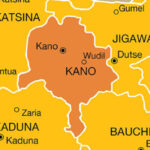KeepLoss gathered that the strike struck IRIB’s main studio complex located in Tehran’s District Three, a central area of the Iranian capital. The attack marks a significant development in the increasingly volatile relations between the two regional powers and mirrors similar Israeli operations that have targeted media institutions in Gaza, the West Bank, and southern Lebanon in recent months.
During the incident, renowned Iranian news anchor Sahar Emami was on air delivering a live commentary when a thunderous explosion rocked the building. The blast caused a cloud of smoke and debris to fill the studio, bringing the broadcast to an abrupt halt. Video footage later surfaced showing Emami declaring, “Aggression against the homeland… and the truth,” before fleeing the set. In the background, an unidentified voice could be heard shouting, “God is greatest!”
Despite being visibly shaken, Emami reportedly returned to the studio and resumed the broadcast shortly after, symbolizing resilience in the face of aggression.
According to reports, the Israeli military had issued a warning to the area shortly before the strike, although the extent of evacuation carried out at IRIB remains unclear. Several staff members were believed to be inside the building at the time of the attack, and emergency services have since been deployed to the scene.
Confirming the operation, Israeli Defence Minister Israel Katz released a terse and provocative statement: “The Iranian propaganda and incitement mouthpiece is on its way to disappear.” He emphasized that the facility had allegedly been serving military communication purposes under the guise of a civilian media organization, although the Israeli Defence Forces (IDF) did not present any concrete evidence to support the claim.
Iran swiftly condemned the attack through its Ministry of Foreign Affairs. Spokesperson Esmaeil Baghaei denounced the bombing as a blatant war crime and a deliberate attempt to silence the Iranian media. “This was a wicked act—a cowardly attempt to erase truth,” Baghaei said in a statement posted on X (formerly Twitter). He also called on the United Nations Security Council to intervene immediately, warning of the risk of wider regional destabilization.
Baghaei further described Israel as “the number one killer of journalists and media professionals,” citing the growing number of press casualties in areas affected by Israeli military operations. This accusation was echoed by the Committee to Protect Journalists (CPJ), which released a strongly worded statement condemning the airstrike.
“We are appalled by Israel’s deliberate targeting of Iranian state television,” the CPJ said via its official X account. “This attack underscores an alarming trend of impunity and bloodshed. The killing of journalists must end now.”
The CPJ added that since October 2023, Israeli forces have been responsible for the deaths of at least 178 journalists in Gaza, making it the deadliest period for members of the press in recorded history.
IRIB’s head, Peyman Jebelli, also responded to the strike, linking the attack to the network’s pivotal role in Iran’s information warfare against Israel. Speaking to Mehr News Agency, Jebelli emphasized the strategic significance of IRIB’s reporting. “Our media outlet plays a vital role in confronting Zionist propaganda. The bombing only proves that our coverage has struck a nerve,” he said. “Our journalists remain committed to revealing the true face of the Israeli regime.”
Meanwhile, Iranian journalist Younes Shadlou, reporting live from the aftermath at the IRIB site, expressed deep concern over the fate of his colleagues. “We had received warnings to evacuate,” he explained. “But our team chose to remain, to the last moment, in order to show the world what the Zionist regime is truly capable of.”
The attack has further strained already fragile relations between Iran and Israel and raised serious concerns among international observers over the targeting of media institutions during armed conflicts.
As the region teeters on the brink of broader conflict, calls for restraint and adherence to international humanitarian law continue to mount, especially regarding the protection of journalists and civilian infrastructure.













